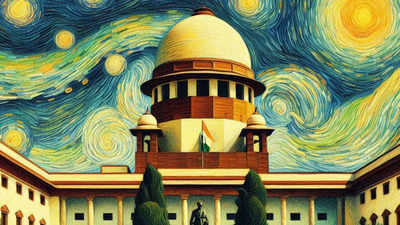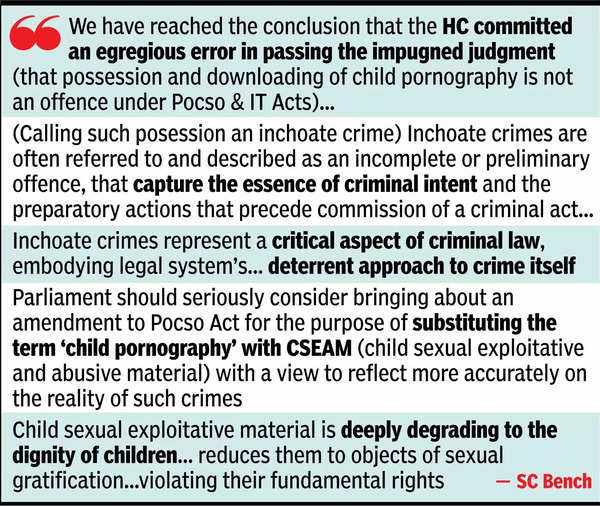- News
- India News
- Supreme Court: Viewing 'child porn' is offence under Pocso, IT Acts
Trending
Supreme Court: Viewing 'child porn' is offence under Pocso, IT Acts

This is an AI-generated image of the Supreme Court of India.
NEW DELHI: In a landmark verdict, Supreme Court on Monday ruled that mere viewing of child pornographic material on the internet is also an offence under Section 15 of the Protection of Children from Sexual Offences (Pocso) Act and provisions of Information Technology Act, thus considerably expanding the scope of the two laws through purposive interpretation.
A bench of CJI D Y Chandrachud and Justice J B Pardiwala said, "Any act of viewing, distributing or displaying of any child pornographic material...over the internet without any actual or physical possession or storage of such material in any device or in any form or manner would also amount to 'possession' in terms of Sec 15 of Pocso Act."
The verdict settled conflicting high court verdicts and accepted senior advocate H S Phoolka's argument on behalf of NGO 'Just Rights for Children Alliance' to set aside an "egregiously erroneous" order of Madras HC, which quashed a Pocso case against a porn-addict, saying he had not circulated it.

In a significant step to check proliferation of child porn on the internet, SC Monday said social media intermediaries cannot claim exemption, or 'safe harbour', under IT Act without deleting such offensive videos, images and reporting about this to police as per Pocso Act mandate.
Section 79 of IT Act provides 'safe harbour' to intermediaries, that is non-liability for third-party information, data or communication links made available or hosted by them, if they follow the prescribed due diligence. Pocso Act places an obligation on them to not only report offences thereunder but hand over material, including source from which such material originated, to the special juvenile police unit or the local police or cyber crime portal.
A bench of Chief Justice D Y Chandrachud and Justice J B Pardiwala referred to a MoU between National Crime Records Bureau under home ministry and National Centre for Missing and Exploited Children (NCMEC), a US-based NGO, which requires all social media intermediaries to report cases of child abuse and exploitation to NCMEC for forwarding it to state police concerned for necessary action.
The bench expressed concern that intermediaries only complied with the requirement under the MoU but did not report child abuse and exploitation cases to local authorities as mandated under Pocso Act. "An intermediary cannot claim exemption from liability under Section 79 of IT Act for any third-party information, data or communication links made available or hosted by it, unless due diligence is conducted by it and compliance is made of these provisions of Pocso Act," the bench said.
"Social media intermediaries, in addition to reporting the commission or the likely apprehension of commission of any offence under Pocso Act to NCMEC is also obligated to report the same to authorities specified under Section 19 of Pocso Act, ie special juvenile police unit or local police," it said.
The bench cautioned courts against showing any leniency or leeway in offences under Section 21 of Pocso Act, "particularly to schools/educational institutions, special homes, children's homes, shelter homes, hostels, remand homes, jails etc who failed to discharge their obligation of reporting the commission or apprehension of commission of any offence or instance of child abuse or exploitation under Pocso Act".
A bench of CJI D Y Chandrachud and Justice J B Pardiwala said, "Any act of viewing, distributing or displaying of any child pornographic material...over the internet without any actual or physical possession or storage of such material in any device or in any form or manner would also amount to 'possession' in terms of Sec 15 of Pocso Act."
The verdict settled conflicting high court verdicts and accepted senior advocate H S Phoolka's argument on behalf of NGO 'Just Rights for Children Alliance' to set aside an "egregiously erroneous" order of Madras HC, which quashed a Pocso case against a porn-addict, saying he had not circulated it.


'No IT Act relief for social media intermediaries'
In a significant step to check proliferation of child porn on the internet, SC Monday said social media intermediaries cannot claim exemption, or 'safe harbour', under IT Act without deleting such offensive videos, images and reporting about this to police as per Pocso Act mandate.
Section 79 of IT Act provides 'safe harbour' to intermediaries, that is non-liability for third-party information, data or communication links made available or hosted by them, if they follow the prescribed due diligence. Pocso Act places an obligation on them to not only report offences thereunder but hand over material, including source from which such material originated, to the special juvenile police unit or the local police or cyber crime portal.
A bench of Chief Justice D Y Chandrachud and Justice J B Pardiwala referred to a MoU between National Crime Records Bureau under home ministry and National Centre for Missing and Exploited Children (NCMEC), a US-based NGO, which requires all social media intermediaries to report cases of child abuse and exploitation to NCMEC for forwarding it to state police concerned for necessary action.
The bench expressed concern that intermediaries only complied with the requirement under the MoU but did not report child abuse and exploitation cases to local authorities as mandated under Pocso Act. "An intermediary cannot claim exemption from liability under Section 79 of IT Act for any third-party information, data or communication links made available or hosted by it, unless due diligence is conducted by it and compliance is made of these provisions of Pocso Act," the bench said.
"Social media intermediaries, in addition to reporting the commission or the likely apprehension of commission of any offence under Pocso Act to NCMEC is also obligated to report the same to authorities specified under Section 19 of Pocso Act, ie special juvenile police unit or local police," it said.
The bench cautioned courts against showing any leniency or leeway in offences under Section 21 of Pocso Act, "particularly to schools/educational institutions, special homes, children's homes, shelter homes, hostels, remand homes, jails etc who failed to discharge their obligation of reporting the commission or apprehension of commission of any offence or instance of child abuse or exploitation under Pocso Act".
End of Article
FOLLOW US ON SOCIAL MEDIA










